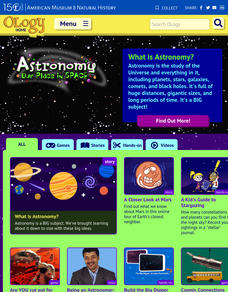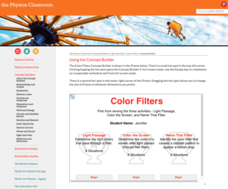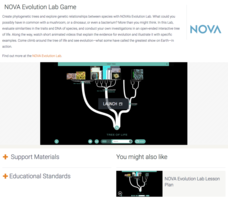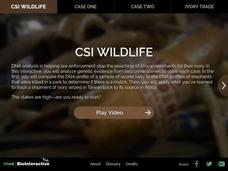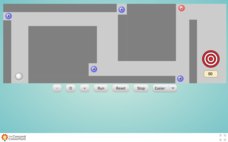American Museum of Natural History
Planetary Mysteries
A website all about planetary mysteries—it's a one-stop-shop for all things, stars, planets, and space travel. Scholars read an astronomy overview to discover the page's big ideas, then choose from the plethora of resources, including...
PBS
Who, Me? Biased?: Understanding Implicit Bias
A 10-page interactive explains different facets of implicit bias, demonstrates how implicit bias works, and how people can counteract its effects. The interactive tools permit users to save their information in "My Work" folders, to take...
Echoes & Reflections
Timeline of the Holocaust
An interactive timeline uses images, videos, primary source documents, and links to informational text to chronicle the history of the Holocaust from 1933-1945.
Magic of Physics
Forces Lab
Here's a force to be reckoned with in the physics classroom! Scholars discover the movements associated with tension, compression, and other common forces through a hands-on simulation. Pupils pull, push, and twist their way through each...
Smithsonian Institution
The Price of Freedom: Americans at War
An interactive resource covers all of the United States' most prominent and influential historic wars including the Vietnam War, the Cold War, the War of 1812, and the Korean War. Learners observe cause and effect as well as how violence...
Howard Hughes Medical Institute
Drug Adherence and Resistance
The FDA approved more than 25 drugs to treat HIV—and often people must use them in combination. One of the largest challenges with these medications happens due to patient error. Class members use an interactive to learn about drug...
Physics Classroom
Color Filters
Filters provide amusing changes to images in applications other than just Instagram! High school pupils apply their knowledge of colored filters to three different interactive sets of puzzles. They identify light colors that pass through...
Physics Classroom
Color Pigments
Objects contain pigments that selectively absorb a wavelength of light, and our eyes only observe a very small range of these wavelengths. Scholars apply these two facts to three different activities. They identify the pigment in an...
Physics Classroom
If This, Then That: Color
The dress color debate of 2015 taught the importance of understanding how we see light. Scholars view a shirt under two different colored lights and then must predict what color the shirt will appear under a third light. They apply color...
Physics Classroom
Light Intensity
Light intensity varies by the strength of the light bulb as well as the distance to the light bulb. Pupils apply these concepts independently at first. They must solve for the light intensity as either the distance or the wattage of the...
Physics Classroom
Spectrum
Scholars relate each of the colors in the spectrum, except indigo, by comparing their frequencies, wavelengths, and energy levels. Then, they compare each section of the electromagnetic spectrum when considering the same three variables.
Physics Classroom
Total Internal Reflection
Scholars work through three different activities applying their knowledge of total internal reflection (TIR). First, they simply identify which diagrams create TIR and which don't. Next, they match different types of boundary behaviors...
Physics Classroom
The L.O.S.T. Art of Image Description - Converging Lenses
Magnifying glasses and cameras often use converging lenses, but how do they alter an image? Pupils discover a lens, axis, and object arrow before identifying four characteristics of the resulting image. They label the location,...
Physics Classroom
Law Enforcement - Refraction
Pupils apply their knowledge of refraction to four different sets of challenges. Each of the first three focus on one variable's impact on the direction of bending. The fourth combines variables for greater challenge.
Physics Classroom
The L.O.S.T. Art of Image Description - Curved Mirrors
We see curved mirrors every day in spoons, rear-view mirrors, stores as a safety measure, make-up mirrors, and in novelty stores. Scholars explore the changes to an image based on the curve of the mirror, the location of the image, and...
Physics Classroom
Who Can See Who?
While only briefly mentioned in most Physics books, plane mirrors and their applications offer the basics necessary for future studies. While working through an interactive, pupils demonstrate knowledge of both reflection and its forms....
Physics Classroom
Law of Reflection
Reflection seems simple to understand, but without a complete understanding, pupils struggle with ray diagrams, specular versus diffuse reflection, total internal reflection, and image formation. An engaging interactive provides three...
PBS
NOVA Evolution Lab Game
Many scholars study phylogenetic trees without understanding how they are made. Through an online game, young scientists use the given data to create phylogenetic trees of increasing complexity. They rely on the trees they create to...
Howard Hughes Medical Institute
CSI Wildlife
Can DNA fingerprinting prevent the extinction of elephants? Young scientists learn about DNA fingerprinting before applying their knowledge to case studies of elephant poaching. The first case requires them to match the DNA from a tusk...
Concord Consortium
Electrostatics: Maze Game
Ready to have an a-MAZE-ing time teaching electrostatics? Introduce physical science superstars to an engaging resource that tests their knowledge of attractive and repulsive forces. Pupils change the charge of a ball to guide it through...
Concord Consortium
Charge Intensity and Electric Force
Looking for a quick way to supercharge your electricity and magnetism unit? Assign a very responsive interactive designed to illustrate the relationship between charge, electric field, and the resulting forces. Learners experiment with...
Concord Consortium
Atom and Ion Builder
Explore and control the building blocks of atoms! Physical science superstars add and remove subatomic particles to create atoms and ions with an easy-to-use interactive. An alternate activity includes an assignment that focuses on the...
Concord Consortium
Polarization
This is one cool resource for teaching about polarity! Chemistry scholars observe electron distribution and molecular shape as they select different non-metals and form bonds. The interactive offers two views, surface charge and electron...
GeoGebra
GeoGebra Graphing Calculator
So, exactly, what does it look like? The easily usable graphing calculator allows pupils to visualize the graph of equations and inequalities. The interactive supports any algebraic graph needed for high school mathematics and then some.


